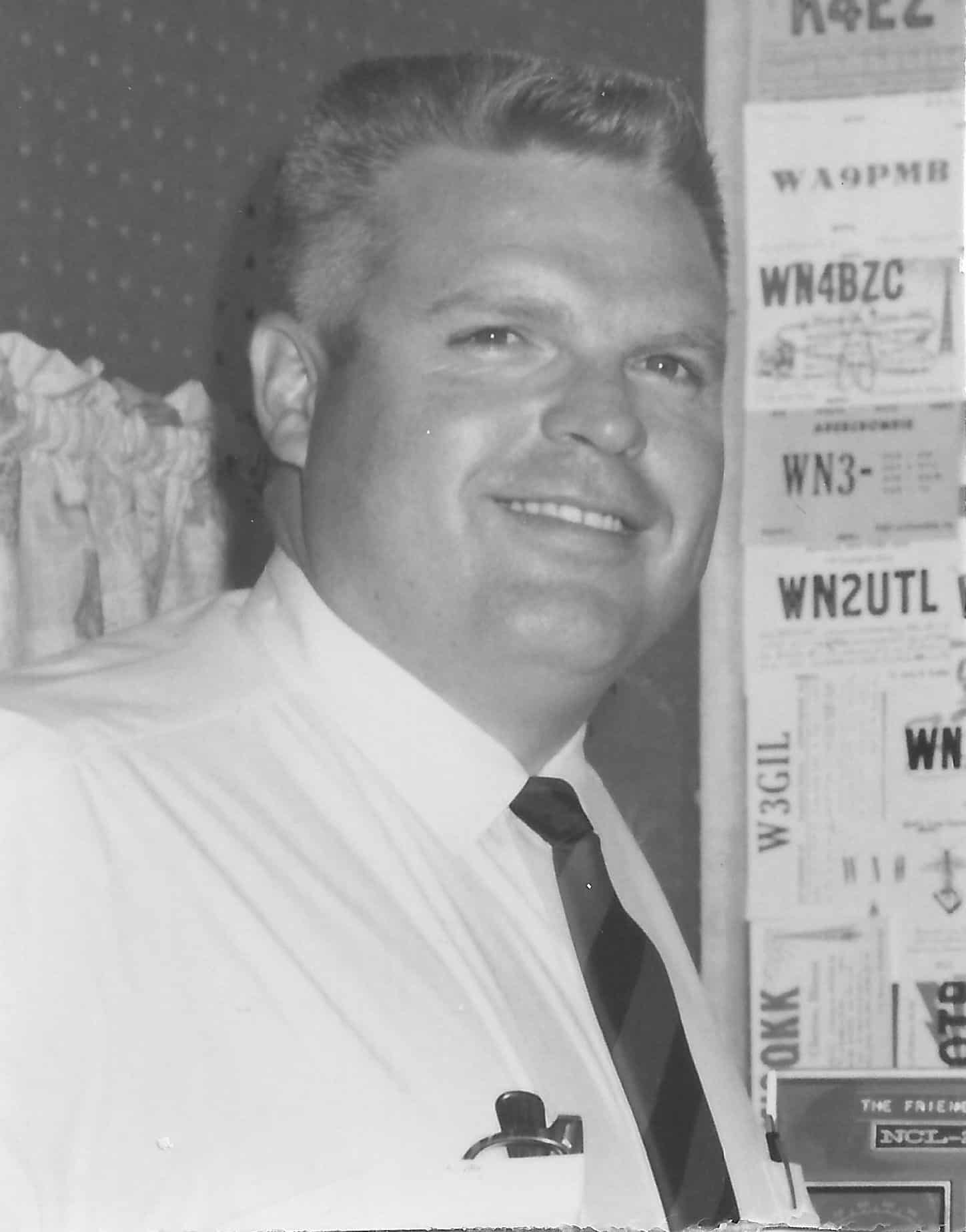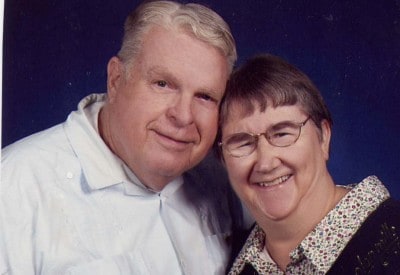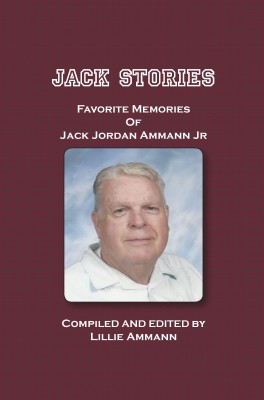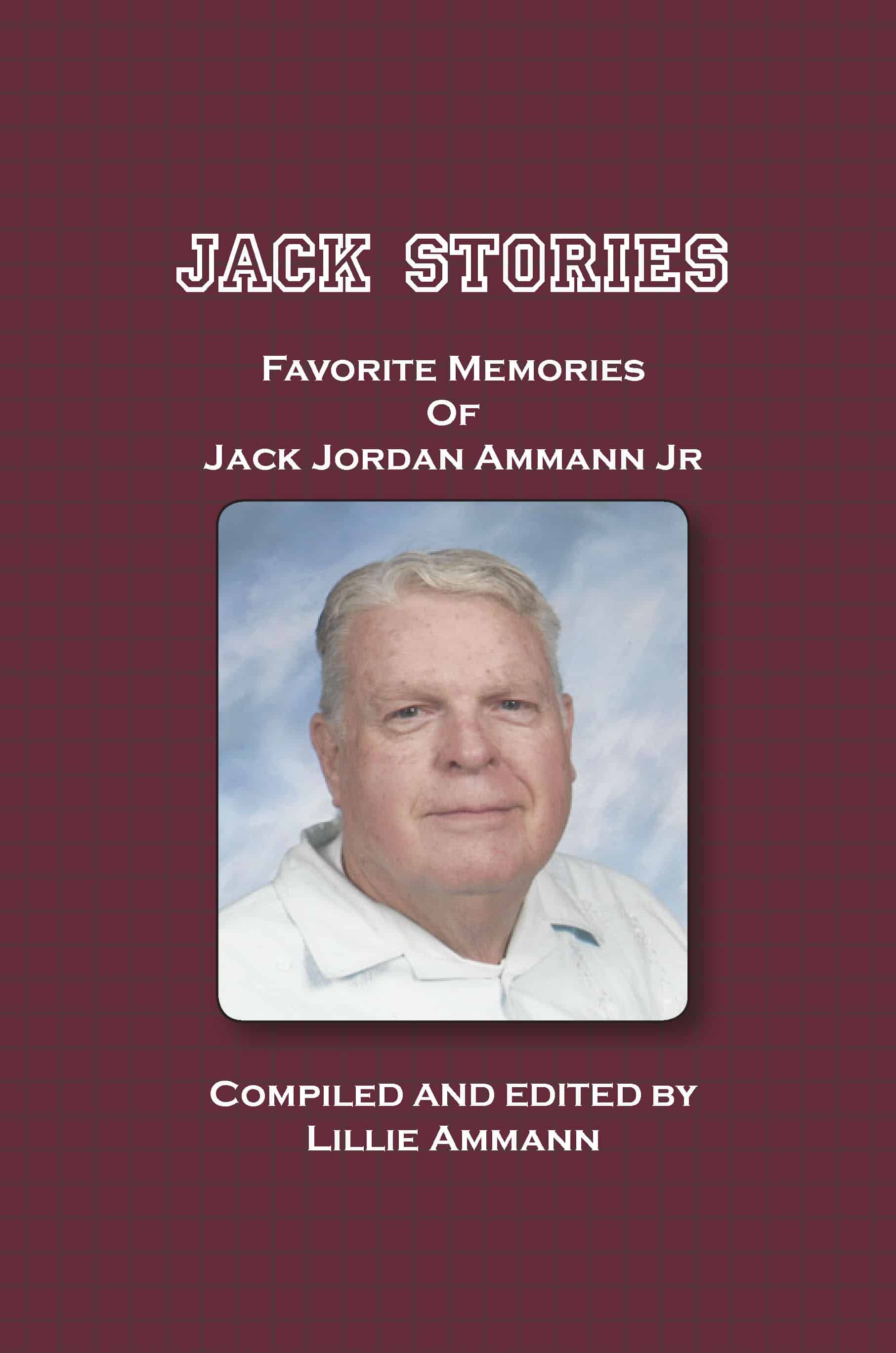
Jack in His “Ham Shack” about the Time Lillie and Jack Met 
Jack Advertising Lillie’s Novel Dream or Destiny 
Jack and Lillie “Just Married” 
Jack and Lillie in Later Years
My father disliked Jack long before he met him. After all, Jack was thirteen years older than me, divorced, and—worst of all—a city slicker. Daddy was convinced he was out to take advantage of this naive farm girl, and Daddy didn’t want to see me hurt. But when I announced that I was going to marry Jack with or without Daddy’s blessing, even though I really wanted his approval, Daddy relented and agreed to give Jack a chance.
Early in our marriage, Daddy asked Jack to help vaccinate and brand cattle. I think Daddy thought this city slicker would decline, or if he accepted, he would complain and be of little or no help. At lunch, Jack was so excited telling me about what they did. “Your daddy slaps the cow on the rump while someone sticks them with the vaccinating needle, and the cow doesn’t even realize what happened.” He was amazed at that and went on and on about their experiences of the morning. Of course, everyone else at the table knew all about this, but we all loved Jack’s enthusiasm.
That moment may have been when Jack and my daddy bonded, and they loved each other deeply for the rest of Daddy’s life. Jack was as devastated as the rest of the family when Daddy was diagnosed with Alzheimer’s—watching the deterioration of the strong, smart, gentle man was painful for all of us.
Two decades later, Jack apparently recognized the symptoms in himself long before I or anyone else did. He had always expressed his love to me in words and deeds many times a day. He would leave me notes—not pretty cards but scraps of paper he recycled—telling me he loved me. But in his mid-seventies, he would suddenly appear at my office door and say, “No matter what happens, I want you to always remember how much I love you.”
At other times, he would say, “I don’t understand how your father could forget your mother.” Although he had said similar things while my father was alive, I found it strange that he was thinking and talking about that so long after Daddy’s death. Later, I realized that he was afraid he was going to forget me, and he wanted to remind me—and perhaps himself—of his love.
The first signs Daddy exhibited were memory losses and confusion; Jack’s first outward symptoms were personality changes.
Jack always had a quick temper—but it was as quick as to end as it was to start. And his short bursts of temper were unpleasant, but never cruel. That changed, though, in his mid-seventies. He was easily agitated and more aggressive. One time, he called me a vile name and shoved me into the kitchen cabinet. Hours later, after he calmed down, I told him I would not tolerate that. He broke down in tears. “Why are you saying that?” he asked. “You know I would never call you that word. You know I would never push you!”
That’s when I realized that not only was he not in control of his behavior, but he wasn’t even aware of it. He was diagnosed with Alzheimer’s and put on medication. Since Alzheimer’s is such an unpredictable disease, it’s often hard to tell if the medication is helping. In Jack’s case, though, I believe the medication calmed him down. He still got very agitated, especially when facing change or new situations. However, he never again became as aggressive as that day in the kitchen and never again called me ugly names.
His memory continued to deteriorate, though, and he was often confused. He became more and more dependent on me, and for the last couple of years of his life, I was with him and cared for him round the clock. We didn’t get out much, except for our weekly 2 AM trips to Walmart, followed by breakfast at Denny’s.
We always had the same waitress, since she was the only one on duty at that time of night. She noted that she would ask Jack something, and rather than responding, he would look at me. I would repeat what she said, and he would answer. She would say, “You said the exact words I did, and you’re not speaking any louder than I am. How can he understand you and not me?”
After forty-five years of marriage, we understood each other perfectly. Well, perhaps not perfectly. As his condition worsened, he said and did things that didn’t make sense. However, while I couldn’t figure everything out, I got very good at deciphering what he meant or why he did what he did.
I’m so thankful that God let him keep his sense of humor to the end. He couldn’t understand subtle humor and often missed the punchlines of jokes, but he still laughed and found humor every day. And he was happy. We often just sat on the front porch, watching our cat and looking out over the neighborhood. He frequently turned to me and said, “We have a good life, don’t we?”
And I’m thankful that he always knew me. Near the end, I had one brief scare. I was helping him dress. Suddenly he said, “I don’t want you to help me. I want Lillie.” My heart sank. But I turned his face to mine, held his hands, and said, “Look at me.” He gazed into my eyes. I said, “I am Lillie.” He looked at me a few seconds longer, then said, “Okay” and allowed me to finish dressing him.
Six years ago today, Jack, who had been uncommunicative for several hours, slipped away to Heaven with me at his side holding his hand. I still miss him terribly, but I am so thankful for many things. We were married more than forty-five years, and we never lacked for love and laughter. I feel especially blessed that God took him before his Alzheimer’s advanced to the stage where he didn’t know me. That was his greatest fear, and God spared him—and me—from that. And I know he is in Heaven filled with joy right now, and I will be too one day.
A friend will take me to the cemetery today. I know a lot of people like to talk to their loved ones at the cemetery, but I don’t say much there. I still talk to Jack in the home I moved into on the day we married, where we shared so much life and love.

You can read more memories of Jack—his own favorite stories and anecdotes from friends and family, in Jack Stories: Favorites Memories of Jack Jordan Ammann Jr.

